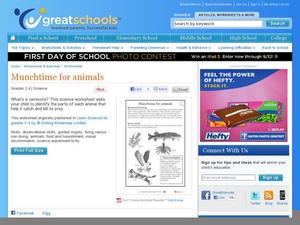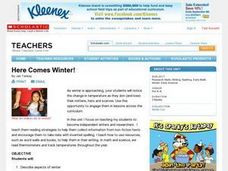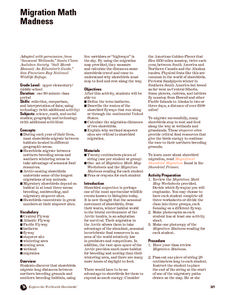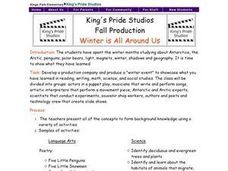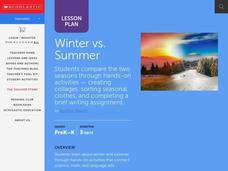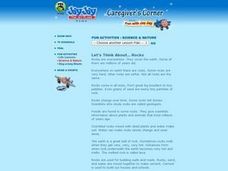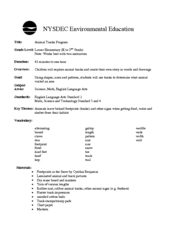Curated OER
Winter-time Temps
Students measure temperature and become aware the the temperature above and below the snow is different. In this winter temperature lesson, students measure temperatures to find variation based on how the snow is packed. Students...
Curated OER
Plants and Animals: Alike and Not Alike
After reading an informative paragraph that outlines some of the differences between plants and animals, fifth graders attempt to correctly categorize 12 words in a word bank. They must put them in the plant, or animal category. This...
Curated OER
Munchtime for animals
Which animals eat meat to stay alive? Third graders group fish, hawks, and cats into carnivores and herbivores. An extended activity prompts kids to cut out magazine pictures of different animals according to the foods that they eat.
Curated OER
Here Comes Winter!
Students investigate winter behaviors in animals. They describe winter and write about the characteristics of the season by drawing and labeling a winter picture. Students then conduct research on a chosen animal and create a chart. ...
Curated OER
Track Traces
Students explore animal characteristics by participating in an animal anatomy activity. In this animal tracks lesson, students identify the differences between specific animals and the shape of their footprints. Students utilize a...
Prince William Network
Migration Math Madness
A great way to incorporate math into life science, this lesson has learners measure migratory routes on a map and calculate the actual distance that shorebirds on the routes would cover. Learners compute the distance covered in both...
Curated OER
Winter is All Around Us
Students present what they have learned on Antartica. Students identify deciduous and evergreen trees and plants; identify and study about the habitats of animals that migrate, hibernate, and adapt; study the Aurora and Aurora Borealis...
Curated OER
Name That Critter
Young learners classify five different animals into their proper category. The animals pictured are a pigeon, a lizard, a cat, a frog, and a goldfish. Pupils are also asked to tell why they know it's a certain kind of animal. An...
National Park Service
Nutcracker Fantasy
The Clark's nutcracker bird hides seeds in 25,000 different sites every year to save for winter. Lesson demonstrates how difficult it would be to find these seeds months later when they need them for food. In the first of five lesson,...
Curated OER
Winter vs. Summer
Learners explore the seasons. In this winter and summer lesson, students read The Snowy Day by Ezra Jack Keats and Summer by Maria Ruis. Learners compare the 2 seasons as they create t-charts, try on seasonal clothing, and create collages.
Curated OER
Animals Finding Rice Paddies
Fourth graders examine the animals who live in rice paddies and create a chart. In this rice lesson, 4th graders link the types of animals living in each ecosystem with a bar graph. Students use colored bars to show...
Curated OER
The Hat
Honing reading and communication skills through the theme of farm animals is the focus of this lesson. Students read a book about Scandinavian farm animals and complete prediction journal activities. They complete a worksheet about the...
Curated OER
Inuit Sled Dogs
This is a terrific resource! Have your class learn about Inuit sled dogs using this lesson. They discuss how the Inuit travel and the needs of their sled dogs. This lesson includes a math activity, discussion questions and a cooperative...
Curated OER
Winter Animal Match
Students play a game. In this matching lesson, students learn about animals and their winter homes. Students match cards of animals with the cards of winter homes.
Curated OER
Math: Counting on Others
Students use counting skills to decide who wins the Classroom Winter Games. They use numeral writing and tally marks to keep score. Students have an opportunity to pretend they are competing for medals in the Winter Games while using...
Curated OER
How Animals Prepare for the Winter
Students study animals. In this hibernation instructional activity, students are read Stranger in the Woods and they discuss what various animals do in their habitat during the winter. They work as a class to create their own hibernation...
Curated OER
Food chains at sea
Fifth graders interpret a table of data about food chains in the ocean. They create a food chain to represent the information on the table. Periwinkles eat seaweed, and crabs eat periwinkles - so who eats crabs? Extend the activity with...
Curated OER
Animal Tracks Program
Entice your learners with this lesson on animal footprints. After reading the story Footprints in the Snow by Cynthia Benjamin, they use photos to identify animals and their footprints. Then they participate in an activity to classify...
Curated OER
Life in the Arctic
Students create a model of an arctic animal. In this animal adaptation lesson, students research an arctic animal, create a 3-D model of their animal, and explain the physical characteristics animals in the arctic need to survive.
Curated OER
Animal Jr. Christmas Worksheet
In this Christmas animal math worksheet, students solve 36 single and double-digit addition problems and then follow the coloring key and color in each sum a different color.
Curated OER
Get Ready, Get Set, Hibernate
Young scholars match each body part or idea from a work bank about methods of animal adaptations for winter survival. They observe as the first one, food is covered with the whole class before completing the rest of the diagram. They...
Scholastic
Math Word Problems
After reading The Mitten by Jan Brett, youngsters willuse the characters in the story to write word problems for addition and subtraction. For example, they may state that a rabbit had 7 carrots and then lost 2, how many were left? There...
Curated OER
Getting nosy
A nose knows! Connect animals to their noses with a fun science activity. Animals include elephants, rats, pigs, and even humans. For a science exploration, kindergartners answer questions about what they can smell. A great addition to...
K5 Learning
Survival in the Wild
How do animals survive in the wild? Read about the different adaptations such as camouflage and self-protection that animals use to survive.




